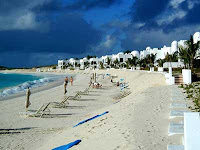The cost of corruption
By Dennis Chung
Friday, December 29, 2006
On Christmas Eve, Sunday, December 24th, the Gleaner published an article confirming what many of us have known for a long time. The report, entitled "Confession of a corrupt cop", told of the ways the police corruptly made money by protecting criminals and making evidence disappear.
It went on to speak about the silent code of not informing on a colleague, as this is seen as support. In my mind this is no different from the same "informer culture" that the police so publicly chastise inner-city citizens about, and in the latter case it is more a means of survival rather than protecting wrongdoing.
The 2006 Transparency International Corruption Perception Index showed Jamaica at a score of 3.6 out of 10, with 10 being the least corrupt. Other Caribbean countries scoring lower than Jamaica were Haiti (1.8), Guyana (2.5), Dominican Republic (2.8), Trinidad & Tobago (3.2), and Cuba (3.5). Barbados of course was at a score of 6.7. Is it any wonder that Barbados is perceived as the most developed Caribbean country? The fact is that corruption has a significant economic cost, and is a primary reason why economies underperform.
Corruption culture
Many commentators have been saying for sometime that corruption in the police force, and the political support given to it by way of denial over the years, is a fundamental reason why Jamaica is in this economic plight. Whenever a civil servant takes "a smalls" to do a favour for someone, the customs officer takes a bribe to let in a shipment of guns, or a politician awards a contract because of political affiliation, it eats away at our moral fibre and necessitates a premium for persons doing business in Jamaica.
The fact is that if one were doing business in the war-torn area of the Congo, you would demand a return way in excess of normal profits for the risk. Similarly, when we create a culture of corruption it means that the return required for doing business in Jamaica is higher than countries such as Barbados. This will have an effect on driving inflation as quicker returns are required. It also discourages any investment in long-term asset creation. We therefore end up with a trading and service society, which Jamaica has transformed into over the years.
This is one of the primary reasons why I have always said that Jamaica does not have an economic problem, but rather a social one. We have bauxite reserves, an attractive tourism product, the best coffee, reggae music, and we can go on and on. So from an economic standpoint there are many products that we have a natural competitive advantage in, which means that we have the basic requirements for economic growth. What we do not have is a society that can create wealth from our natural resources. And this is partly because by our actions we have so corrupted rational market behaviour that resources are not efficiently allocated.
When a politician awards a contract because of political affiliation it means that the best person may not get the contract, and because it is not awarded on a competitive bid then what results is mediocre work. The contractor knows that irrespective of the quality of the work performed that he/she will still be paid, and more often than not the price escalates.
When a police officer turns his back when confronted with an illegal situation it creates an unfair competitive advantage for the criminal whose only purpose of starting a business is to launder money, rather than create a productive organisation. When a member of parliament wins an election because his/her cronies stuff ballot boxes, it means that there is no drive to improve people's lives, as whether people vote or not then he/she will be returned to power.
These examples illustrate clearly that corruption has a significant cost as it prevents markets from working in an efficient manner, and this in turn makes countries uncompetitive. It is this sort of culture that kills entrepreneurialism more than anything else.
Need for rules
In order for companies or countries to grow, there need to be rules or processes by which they act. For example, at one extreme if there was no justice system then what results is anarchy. In this case, if someone has a commercial dispute, then instead of resolving it in the courts they may seek to do so by strong-arm tactics and what's worse is that the winner may be the incorrect one.
If a company does not have guidelines for how they invest, then investments could happen because of friendship or the emotional decision of one person. In both cases, we see that the most efficient solution would not be arrived at, resulting in a corrupt business environment in the first case and possibly significant losses in the latter.
Similarly, corruption has the effect of removing predictability from business decisions. We have, for example, heard of the high cost of doing business in Nigeria as at almost every level someone has to be paid. Only the most daring and those with connections end up doing business in such a country, despite their large oil reserves.
Nigeria is proof that even if a country has one of the most valuable resources in the world, the viability of the economy is not guaranteed unless the society is organised in a manner designed to exploit the natural advantages. This is the primary advantage that developed countries have over underdeveloped and developing countries.
Whatever we may say about the United States, it is this organisation and predictability that drives people to want to live there. The result is that the best minds will usually live in such a country, as they do not have to rely on their connections to survive. This points to another effect of corruption. It prevents the development of our human resources. After all, why get educated if all I have to do is know a bigwig in the government who can send a contract or two my way, when my friend who has wasted years at university, and missed nights of partying does not end up making the same money I do? After all, whether he is smarter than me or not will not make me lose the contract.
Companies also compromise their development in this way. The administrative assistant who knows how to befriend the boss, or the person who runs personal errands, ends up getting the promotion and the most favour.
This sort of behaviour makes a company inefficient, uncompetitive, and only with luck will it survive at the bottom of the food chain. If we look at multinationals, or companies that remain on top for the long term, what they do is establish rules of performance and a system of accountability. Without this, companies such as Wal-Mart, Microsoft, IBM, and even our very own GraceKennedy could not remain at the top. On the other hand, companies such as ENRON and WorldCom sought to bend the rules and we all know what happened.
This "Confession of a corrupt cop" should therefore not be glossed over. This is at the heart of our economic and social issues and needs to be given the prominence it deserves. Unless we solve this issue of corruption in the police force then we will not be able to see the type of reduction in crime levels that we so desperately need, and the cost to Jamaica will continue to be tremendous.











































